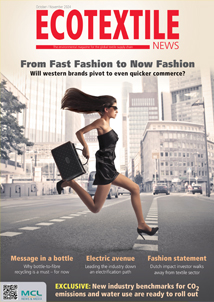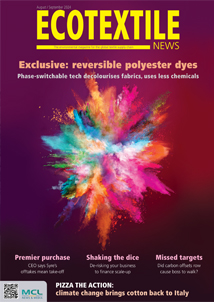WAKEFIELD – Fashion industry commentator Ken Pucker – who recently made waves with an article in which he branded the sector's focus on circularity a “diversion” – is the latest guest on the Big Closets, Small Planet podcast.
Pucker, a professor of the practice at the Fletcher School of Law and Diplomacy at Tufts University, Massachusetts, and a former COO with Timberland, explained his thinking to host Mike Schragger.
For him, circularity is the latest “win–win solution” offered by “Sustainability Inc” – as he dubs the companies, NGOs and consultants engaged on reducing fashion’s footprint – in an attempt to decouple economic growth from environmental impact.
The full podcast, published in partnership with Ecotextile News, is available below.
Pucker, who explained his theory at length in an article, ‘A Circle That Isn’t Easily Squared’, in the Stanford Social Innovation Review, surprised Schragger by saying that he did not think that overconsumption was the real driver behind unsustainable practices in the fashion and apparel industry.
“It is certainly a vital driver, but I would lift up one level to see what it is that drives overconsumption,” he said. “And I would start with the system structure rules and incentives that promote overconsumption.”
Unfettered capitalism had “served humanity well” by reducing poverty and increasing life expectancy over the last 50 years, but on the other hand the global population had doubled, production had tripled, and carbon emissions had also soared, he said.
“If you go back 50 years, the prevailing wisdom then was that to coexist with nature, business had to be regulated,” he argued.
However, the International Chamber of Commerce then successfully sought to promote a different message – one that said development led by business could ensure a sustainable future.
They were supported by well-intentioned academics, consultants, NGOs, executives and investors – “Sustainability Inc” as Pucker describes them – who had also been advocating for voluntary corporate-led solutions.
“Two current examples of that are the ESG movement in the world of finance and the circularity movement in the world of fashion,” he said. “Circularity, like all win–win solutions, is rooted in hope.
“It represents the best answer, I think, to the industry’s key sustainability question, which is, how can the fashion industry continue to grow unabated while dealing with hitting the limits of growth or resource limitations?
“However, it hasn’t yet worked at scale. Notwithstanding all the summits and commitments, consultants, and corporate social responsibility reports, today less than 1% of the fashion industry is made in a fully circular loop. So why is it we’re putting so much faith in this idea?"
Find out more about the Big Closets, Small Planet podcast series HERE.








































